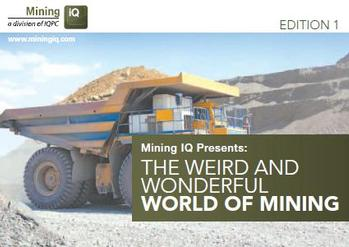Mining IQ is proud to present the second edition of The Weird and Wonderful World of Mining. This mining guide eBook contains hundreds of interesting and valuable facts to be shared and enjoyed throughout the mining industry and community.
The business of mining contributes somewhere in the region of USD $24.5 Billion globally and engages over 100 million people who work in the mining industry. So this week the eBook focuses on The Business of Mining but then also looks at the lighter side of our industry with the Weird/ Wonderful/ Random.
- Did you know that all of the platinum ever mined would fit in the average size living room? Neither did we until a Mining IQ member sent in the fact!
- Did you know that gold is the most ductile (easily molded or shaped) of all metals, allowing it to be drawn out into tiny wires or threads without breaking. As a result, a single ounce of gold can be drawn into a wire five miles long. Gold’s malleability is also unparalled. For example, one ounce of gold can be hammered in a 100 square foot sheet.
- Did you know that coal provides 29.6% of global primary energy needs and generates 42% of the world’s electricity.
- Did you know that archaeologists have unearthed copper drainpipes from as far back as 3,500 BC, that are still in good condition.
Click here to download the eBook: The Weird & Wonderful World of Mining – Edition 2 and find out a whole bunch of other strange facts!
























